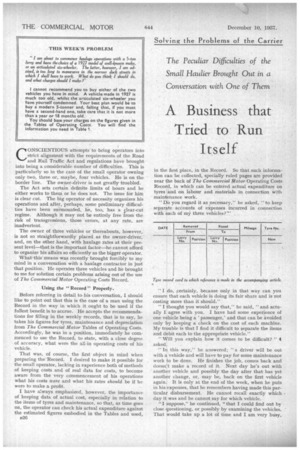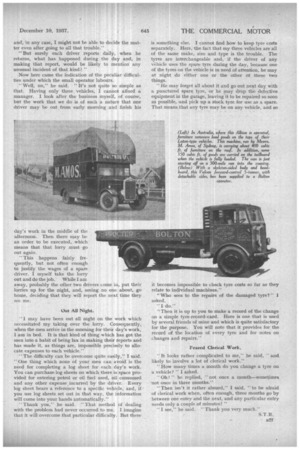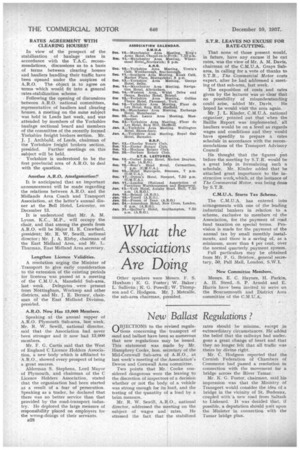A Business that Tried to Run Itself
Page 8

Page 9

Page 10

If you've noticed an error in this article please click here to report it so we can fix it.
The Peculiar Difficulties of the Small Haulier Brought Out in a Conversation with One of Them
CONSCIENTIOUS attempts to bring operators into strict alignment with the requirements of the Road and Rail Traffic Act and regulations have brought into being a considerable number of difficulties. This is particularly so in the case of the small operator owning only two, three or, maybe, four vehicles. He is on the border line. The owner-driver is not greatly troubled.
The Act sets certain definite limits of hours and he either works to them or he does not. The issue for him is clear cut. The big operator of .necessity organizes his operations and after, perhaps, some preliminary difficulties have been surmounted, lie, too, has a clear-cut regime. Although it may not be entirely free from the risk of transgressions, those ' errors, at any rate, are inadvertent. • The owner of three vehicles or thereabouts, however, is not so straightforwardly placed as the owner-driver, and, on the other hand, with haulage rates at their present level—that is the important factor—he cannot afford to organize his affairs so efficiently as the bigger operator.
What this means was recently brought forcibly to my mind in a conversation with a haulage contractor in just that position. He operates three vehicles and he brought to me for solution certain problems arising out of the use of The Commercial Motor Operating Costs Record.
Using the " Record " Properly.
Before referring in detail to his conversation. I should like to point out that this is the case of a man using the Record in the way in which it ought to be used if the fullest benefit is to accrue. He accepts the recommendations for filling in the weekly records, that is to say, he takes his figures for tyres, maintenance and depreciation from The Commercial Motor Tables of Operating Costs. Accordingly, he was in a position, immediately he commenced to use the Record, to state, with a close degree of accuracy, what were the all-in operating costs of his vehicle.
That was, of course, the first object in mind when preparing the-Record. I desired to make it possible for the small operator, lacking in experience both of methods of keeping costs and of real data for costs, to become aware from the very cOmmencement of his operations what his costs were and what his rates should be if he were to make a profit.
I have always emphasized, however, the importance of keeping data of actual cost, especially in relation to the items of tyres and maintenance, so that, as time goes on, the operator can check his actual expenditure against the estimated figures embodied in the Tables and used,
B20
in the first place, in the Record. So that such information can be collected, specially ruled pages are provided near the back of The Commercial Motor Operating Costs Recotid, in which can be entered actual expenditure on tyres and on labour and .materials in connection with maintenance work.
"Do you regard it as ;necessary," he asked, " to keep separate accounts of expenses incurred in connection with each of mir three vehicles?"
"1 do, certainly, because only in that way can you ensure that each vehicle is doing its fair share and is not costing more than it should."
"I thought you would say that," he said, "and actually I agree with you. I have had some experience of one vehicle being a passenger,' and that can be avoided only by keeping a check on the cost of. each machine. My trouble is that I find it difficult to separate the items and debit each to the appropriate vehicle."
"Will you explain how it comes to be difficult?" I asked.
" In this way," he answered; "a driver will be out with a vehicle and will have to pay for some maintenance work to be done. He finishes the job, conies back and doesn't make a record of it. Next day he's out with another vehicle and possibly the day after that has yet another change, or, may be, back on the first vehicle again. It is only at the end of the week, when he puts in his expenses, that he remembers having made this particular disbursement. He cannot recall exactly which day it was and he cannot say for which vehicle.
"I suppose," he continued, "that I could find out by close questioning, or possibly by examining the vehicles. That would take up a lot of time and I am very busy, and, in any case, I might not be able to decide the matter even after going to all that trouble."
'But surely each driver reports daily, when he returns, what has happened during the day and, in making that report, would be likely to mention any unusual incident of that kind? "
Now here came the indication of the peculiar difficulties under which the small operator labours.
"Well, no," he said. "It's not quite so simple as that. Having only three vehicles, I cannot afford a manager. I look after the business myself, of course, but the work that we do is of such a nature that one driver may be out . from early, morning and finish his day's work in the middle of the afternoon. Then there may be an order to be executed, which means that that lorry must go out again.
" This happens fairly frequently, but not often enough to justify the wages of a spare driver. I myself take the lorry out and do the job: While I am away, probably the other two drivers come in, put their lorries up for the night, and, seeing no one about, go home, deciding that they will report the next time they
see me.
Out All Night.
" I may have been out all night on the work which necessitated my taking over the lorry. Consequently, when the men arrive in the morning for their day's work, I am in bed. It is that kind of thing which has got the men into a habit of being lax in making their reports and has made it, as things are, impossible precisely to allocate expenses to each vehicle."
" The difficulty can be overcome quite easily," I said, "One thing which none of your men can avoid is the need for completing a log sheet for each day's work. You can purchase log sheets on which there is space provided for entering petrol or oil fuel used, oil consumed and any other expense. incurred by the driver. Every log sheet bears a reference to a specific vehicle, and, if you use log sheets set out in that way, the information will come into your hands automatically."
" Thank you," he said. "That method of dealing with the problem had never occurred to me. I imagine that it will overcome that particular difficulty. But there is something else. I cannot find how to keep tyre costs separately. Here, the fact that my three vehicles are all of the same make, size and type is the trouble. The tyres are interchangeable and, if the driver of any vehicle uses the spare tyre during the day, because one of the tyres on the vehicle is in need of attention, he may at night do either one or the other ot these two things.
"He may forget all about it and go out next day with a punctured spare tyre, or he may drop the defe.ctive equipment hi the garage, leaving it to be repaired so soon as possible, and pick up a stock tyre for use as a spare. That means that any tyre may be on any vehicle, and so it becomes impossible to check tyre costs so far as they relate to individual machines."
"Who sees to the repairs of the damaged tyre? " I asked.
" I do."
"Then it is up to you to make a record of the change on a simple tyre-record card. Here is one that is used by several friends of mine and which is quite satisfactory for the purpose. You will note that it provides for the record of the location of every tyre and for notes on changes and repairs."
Feared Clerical Work.
" It looks rather complicated to me," he said, "and likely to involve a lot of clerical work."
" How many times a month do you change a tyre on a vehicle? " I asked.
" Oh " he replied, "not once a month—sometimes not once in three months."
"Then isn't it rather absurd," I said, "to be afraid of clerical work when, often enough, three months go by between one entry and the next, and any particular entry needs only a couple of minutes? "
"I see," he said. "Thank you very much." RATES AGREEMENT WITH CLEARING HOUSES?
In view of the prospect of the stabilization of haulage rates in accordance with the T.A.C. recommendations, discussions as to a basis of terms between clearing houses and hauliers handling their traffic have been opened under the auspices of A.R.°. The object is to agree on terms which would fit into a general rates-stabilization scheme.
Following the opening of discussions between A.R.O. national committees, representative of hauliers and clearing houses, a meeting on the same subject was held in Leeds last week, and was attended by members of the Yorkshire haulage sectional board and members of the committee of the recently formed Yorkshire freight brokers settion. Mr. J. J. Archbold, of Leeds, chairman of the Yorkshire freight brokers section,
presided. Further meetings an this subject will be held.
Yorkshire is understood to be the first provincial area of A.R.O. to deal with the question.
Another A.R.O. Amalgamation?)
It is anticipated that an important announcement will be made regarding the relations between A.R.O. and the Midlands Area Coach and Transport Association, at the latter's annual dinner at the .ell Hotel, Leicester, on December 13.
It is understood that Mr. A. M. Lyons, K.C., M.P., will occupy the chair, and that among the guests from A.R.O. will be Major H. E. Crawfurd, president; Mr. R. W. Sewi11, national director ; Mr. J. A. Kirby, chairman of the East Midland Area, and Mr. L. Thurman, East Midland Area secretary.
Lengthen Licence Validities.
A resolution urging the Minister of Transport to give early consideration to the extension of the existing periods for licences was passed at a meeting of the C.M.U.A. Mansfield Sub-area,
last week. Delegates _ were present from Nottingham, Worksop and other districts, and Mr. J. E..Berney, chairman of the East Midland Division, presided.
A.R.O. Now Has 131000 Members.
Speaking at the annual supper of A.R.O. Plymouth Sub-area, last week, Mr. R. W. Sewill, national director, said that the Association had never been stronger and it now had 13,000 members.
Mr. F. G. Curtis said that the West of England C Licence Holders Association, a new body which is affiliated to A.R.O., showed every prospect of being a great success.
Alderman S. Stephens, Lord Mayor of Plymouth, and chairman of the C Licence Holders Association, stated that the organization had been started as a result of a fear of 'persecution. Speaking as a trader, he declared that there was no better service than that provided by the road-transport industry.• He deplored the large measure of responsibility placed on employers for the wrong-doings of their servants.
S.T.R. LEAVES NO EXCUSE FOR RATE-CUTTING.
That none of those present would. in future, have any excuse if he cut rates, was the view of Mr. A. M. Davis, chairman of the C.M.U.A. Grays Subarea, in calling for a vote of thanks to S.T.R., The Commercial Motor costs expert, after he had addressed a meeting of that sub-area, last week.
The exposition of costs and rates given by the• lecturer Was so clear. that no possibility of misunderstanding
could arise, added Mr. Davis, He hoped he would visit the area again. .
Mr. J. L. Kinder, C.M.U.A. national organizer, pointed out that when the Heinle Report was implemented, all hauliers would be on a level as regards wages and conditions and they would have speedily to prepare a rates schedule in accordance with the recommendations of the Transport Advisory Council
He thought that the figures put before the meeting by S.T.R. would be a great help in formulating such a schedule, Mr. Kinder added that he attached great importance to the instructive work, which, at the instance of The Commercial Motor, was being done by S.T.R.
C.M.U.A. Starts Tax Scheme.
The C.M.U.A. has entered into arrangements with one of the leading industrial bankers in relation to a scheme, exclusive to members of the Association, for the payment of road fund taxation on special terms. Provision is made for thepayment of the annual tax by small monthly instalments, and there is a saving of, as a minimum, more than 4 per cent, over the normal quarterly payment system.
Full particulars may be obtained from Mr. F. G. Bristow, general secretary, 50, Pall Mall, London, S.W.1.
New Committee Members, Messrs. E. C. Haynes, H. Parkin-, A. H. Steed, S. P. Arnold and E. Harris have been invited to serve on the Bournemouth and District Area committee of the




























